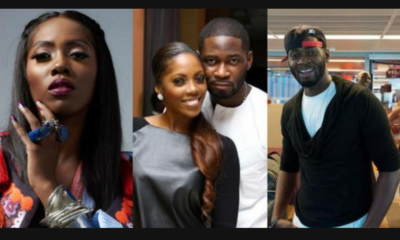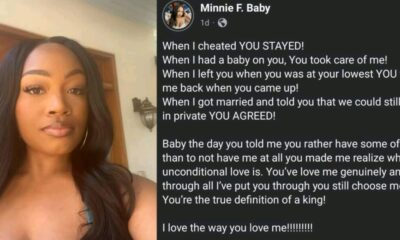Entertainment
Princess Diana’s interview with Martin Bashir echoed by Prince Harry, Meghan with Oprah
In late 1995, Princess Diana was out for revenge.
Her husband, Prince Charles, was cheating on her — an affair known to the entire world. Royal insiders were leaking nasty rumors about her to the British tabloids. Her attempts to assert herself inside the walls of various castles were dismissed..

.
“If you don’t behave, my girl, we’ll take your title away,” her father-in-law, Prince Philip, had recently told her, according to British journalist Tina Brown.
So the jilted princess, much like her son Prince Harry and his wife, Meghan, Duchess of Sussex, did Sunday night, engaged the nuclear option.
Meghan and Harry’s interview with Oprah stunned. But it’s unlikely to change the monarchy.
Diana gave an interview to journalist Martin Bashir in which she unloaded on the royal family.
“There were three of us in this marriage,” she said, referring to her husband’s mistress and future wife, Camilla Parker Bowles. She spoke of her struggles with bulimia, noting that royal family members chided her for wasting food. She even questioned whether her husband had the “character” to be king.
The world was stunned.
“This was extraordinarily historic,” said Beatrix Campbell, an English writer and feminist who wrote “Diana, Princess of Wales: How Sexual Politics Shook the Monarchy.” “How many times has a future heir been called to account for his behavior in front of millions of people? Like, never. And here we are again.”
Prince Harry and his wife, Meghan, spoke with Oprah Winfrey about turning away from life as senior royals in a wide-ranging interview that aired on March 7. (The Washington Post)
Fact-checking ‘The Crown’: Did Princess Diana’s battle with bulimia ruin her marriage?
There are plenty of similarities, Campbell said, between Diana’s tell-all interview and the one the world watched Sunday night with her son and his wife, who spoke to Oprah Winfrey in a prime-time special.
Even before Meghan told Oprah about having suicidal thoughts, Buckingham Palace had already gone on the offensive, announcing an investigation into whether Meghan bullied her staff.
Harry told Oprah he feared “history repeating itself.” His mother was hounded by the tabloids and was being pursued by photographers when she was killed in a car crash in 1997. Harry was 11 when she died.
Meghan said her mother asked her whether Diana had ever done an interview like the one she was doing with Oprah. Yes, a very famous one, Meghan replied.
She and Harry described their decision to leave Britain, weary of the tabloids, the rigidity of the royal family and the racism against Meghan, an American biracial actress.
“The really important thing about this is that both of these people,” Campbell said, referring to Diana and her son, “have discovered their power in a context in which they were, so to say, incarcerated in an amazingly powerful institution but within which they were relatively powerless.”
Diana was powerless because she was an outsider and not even, it turned out, a preferred one. Prince Harry, meanwhile, is powerless because he has as much chance of becoming King of England as the author of this article.
So Diana and Harry, her youngest son, discover that their power lies in blowing the walls off the castle from the inside.
“Their determination to talk,” Campbell said, “is a desperate measure because they’ve discovered, Prince Harry and his mother, that they are just objects in a huge corporate monarchical machine. They don’t have a life. But what they actually do have is a means of bearing witness to what their lives are truly like.”
And that’s through television.
Meghan and Harry interview has Britain abuzz; critics howl in outrage
Diana and her son both went to great lengths to keep their interviews secret until after they were completed. Neither notified the Queen, as royal decorum usually dictates.
In Diana’s case, though there have been investigations into whether Bashir used nefarious means to get access to the princess, she invited him to Kensington Palace on a Sunday evening to do the interview. The household staff wouldn’t be there.
“Security guards had been told to expect the delivery of a new hi-fi system ‘in boxes,’” Brown wrote in her biography, “The Diana Chronicles.” “Once the cameras, microphones, and other equipment had been smuggled in, Bashir and his two-man crew could walk straight up.”
Although family and close friends had strenuously advised her not to do a tell-all interview, Brown wrote that Diana was “determined to tell her story without any interpretation but hers. It was her ultimate psychic striptease for the British public.”
Bashir’s first question: “Your Royal Highness, how prepared were you for the pressures that came with marrying into the Royal Family?”
Diana’s answer: “At the age of 19, you always think you’re prepared for everything, and you think you have the knowledge of what’s coming ahead. But although I was daunted at the prospect at the time, I felt I had the support of my husband-to-be.”
Of course, that wasn’t the case.
Before the interview aired, royal insiders hoped the public would find a Diana who was unsophisticated, evil and petty — roughly along the lines of their whispers to the tabloids.
They must have been disappointed.
“The woman who sat opposite Martin Bashir displayed a dignity, composure, and heartbreaking earnestness that bore no resemblance to the tawdry creature created in the media,” Brown wrote.
Will Harry and Meghan’s tell-all session with Oprah change the way the royal family operates? Based on past history, that’s unlikely.
“I think people assumed,” said Campbell, the English author, “that after the demise and then the death of Diana that the royal family had somehow or another transformed itself from a dysfunctional institution that had enormous power and all the wealth in the world into something that might be recognizably normal. And now it turns out that is not the case.”
-

 Lifestyle1 day ago
Lifestyle1 day agoMan walks into hospital, removes oxygen from female patient to heal her through prayer; she passes away (Video)
-

 Sports2 days ago
Sports2 days agoAdemola Lookman Crowned African Player Of The Year
-

 Celebrity Gossip & Gist1 day ago
Celebrity Gossip & Gist1 day ago“I was Nigeria’s sweetheart until I got divorced, everybody was like, you’re a woman and you’re supposed to build the house” – Tiwa Savage
-

 Love & Relationship1 day ago
Love & Relationship1 day agoWoman praises partner for loving her despite cheating and getting pregnant by someone else








